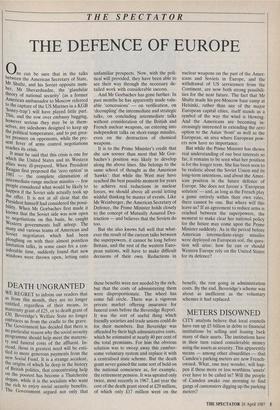DEATH UNGRANTED
WE REGRET to inform our readers that as from this month, they are no longer entitled, regardless of their means, to maternity grant of £25, or to death grant of £30. Beveridge's Welfare State no longer embraces us from the cradle to the grave. The Government has decided that there is no particular reason why the social security programme Should help meet the materni- ty and funeral costs of the affluent. In- stead, those in greatest need will be enti- tled to more generous payments from the new Social Fund. It is a strange accident, the origins of which lie deep in the history of British politics, that concentrating help on the poorest has become a Thatcherite slogan, while it is the socialists who want the rich to enjoy social security benefits. The Government argued not only that these benefits were not needed by the rich, but that the costs of administering them were disproportionate. The wheel has come full circle. There was a vigorous private market offering insurance for funeral costs before the Beveridge Report. It was the sort of useful thing which friendly societies and trade unions could do for their members. But Beveridge was offended by their high administrative costs, which he estimated at nearly 40 per cent of the total premiums. For him the obvious solution was to sweep away this cumber- some voluntary system and replace it with a centralised state scheme. But the death grant never gained the same sort of hold on the national conscience as, for example, the retirement pension. It was uprated only twice, most recently in 1967. Last year the cost of the death grant stood at £29 million, of which only £17 million went on the benefit, the rest going in administration costs. By the end, Beveridge's scheme was about as inefficient as the voluntary schemes it had replaced.


















































 Previous page
Previous page